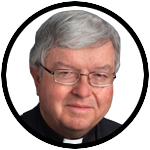
Father Kenneth Doyle
Q. In all of my 78 years (and with 16 years of Catholic education), I have never heard where the word “Mass” comes from to describe the Eucharist. (It seems like an odd word.) (Gambrills, Maryland)
A. The word “Mass” comes from the Latin word “missa.” When Mass used to be celebrated commonly in Latin, the people were dismissed with the words, “Ite, missa est” — which could be translated literally as, “Go, it has been sent.”
This imperative had the same root as the English word “mission,” and it indicated the Christian’s responsibility to carry the fruits of the Eucharist out into the world in one’s daily activities. It highlighted the fact that the dismissal at the end of Mass was not so much a conclusion as a starting point.
[hotblock]
In the current English translation of the liturgy, there are four acceptable options for this dismissal rite. The one that I prefer personally — because I think it best indicates this continuing mission — is, “Go in peace, glorifying the Lord by your life.”
Q. One of my friends wants to become a permanent deacon; but he has a dilemma, and none of us seems to know the answer. He’s in his late 50s now, and more than 20 years ago he had a vasectomy after having three children. We all know that was a sin, but is it so immoral that it would prevent him now from pursuing his dream? (City of origin withheld)
A. Your question is interesting, and the answer a bit more complicated than I would have thought. But first, for readers who might benefit from it, a primer on the permanent diaconate.
The office has its roots in the early history of the church. In the sixth chapter of the Acts of the Apostles, we read of seven men “filled with the Spirit and wisdom” who were chosen by the apostles to assist in the work of the church. Permanent deacons evidently had a large role in the early centuries of the church, but they seem to have disappeared during the Middle Ages.
The office was restored by Pope Paul VI in 1967 following the Second Vatican Council, and a 2016 study estimated the number of permanent deacons in the United States alone at more than 18,000. Permanent deacons undergo a program of preparation in Scripture, theology, canon law, homiletics and liturgy; they are usually married and are authorized to baptize, preach, witness marriages, and conduct wake and funeral services.
In addition, they often play an even wider role in such areas as jail ministry, work with the poor and homeless, hospice and bereavement service, and marriage preparation.
Now, to your specific question. Your friend’s eligibility for the permanent diaconate would largely depend on the bishop of his diocese. The church’s Code of Canon Law lists as among those who are “irregular for receiving orders” a person who has “mutilated himself” (Canon 1041). The Archdiocese of Cincinnati, for example, lists on its website as one of the prerequisites for admission to the diaconate, “never having undergone an effective vasectomy.”
But a dispensation from such an irregularity is within the competence of a diocesan bishop. A bishop, after examining the totality of a man’s qualifications, could conceivably decide that the candidate had repented from his earlier sin and confessed it, led a life of virtue since then and is now a suitable candidate.
***
Questions may be sent to Father Kenneth Doyle at askfatherdoyle@gmail.com and 30 Columbia Circle Dr., Albany, New York 12203.
PREVIOUS: Summer is a time to invest in our relationship with Christ
NEXT: We’re tied to the land we call home, and to each other



Share this story